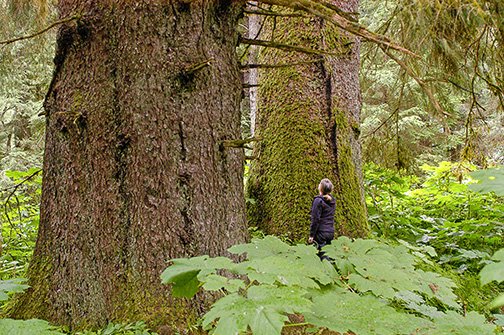With today’s move into the 21st century, the Tongass timber wars are over
Mary Beth Schoen admires a large-tree old-growth stand in Saook Bay on northeastern Baranof Island. Some individual trees there are over six feet in diameter and many centuries old. This riparian area is adjacent to a salmon stream and is full of bear trails. Large-tree old growth stands comprise less than 3% of the Tongass. Photo by John Schoen.
JUNEAU—Today’s U.S. Forest Service announcement ending industrial-scale old growth logging, moving toward restoring Roadless Rule protections, and prioritizing the sustainable uses of the Tongass National Forest is a long-overdue move to shift management of America’s largest national forest into the 21st century.
“The Tongass is not only one of the few truly wild places left on the planet, it is vital to our path forward as we deal with climate change,” said SalmonState communications director Mary Catharine Martin. “We’re thrilled that this announcement recognizes how valuable the Tongass is, both to the people that live here and to the rest of the world.”
At 17 million acres, the Tongass is the largest national forest in the country. It is also an enormous carbon bank and reservoir, storing 44% of the carbon stored in all U.S. national forests. Some of its towering old growth cedar, spruce and hemlock trees are more than a thousand years old. The Tongass is home to a third of the world’s remaining old growth temperate rainforest, and most of the old growth remaining in the United States.
The 2001 Roadless Rule protected 9.2 million acres of the Tongass from clearcut logging and the roads it requires. The 2020 Trump Administration decision to strip those protections opened up those 9.2 million acres to clearcut logging and industrial development against the will of 96% of commenters and 90+% of rural subsistence commenters. Only 3% of the Tongass is large-tree old growth, which has long been targeted by clearcut logging operations. Those operations have been subsidized to the tune of hundreds of millions of dollars by the American taxpayer, all while damaging salmon runs and habitat.
25% of the West Coast’s salmon catch comes from the Tongass National Forest. The remaining old growth habitat is essential for deer, brown bears, salmon and many other species, as well as to the Tongass’ economy: 26% of jobs in the region come from tourism or commercial fisheries, which are supported by the intact forest.
“Today’s announcement signals the end of the Tongass timber wars once and for all,” said Martin. “This bold and forward-thinking move by the Forest Service allows all of us who love this forest and call it home to focus squarely on the future and leave the past behind.”

